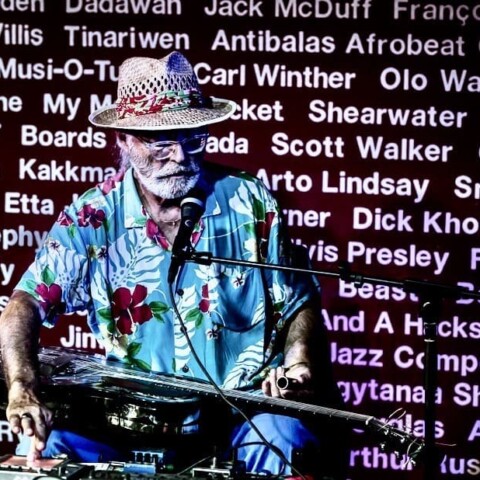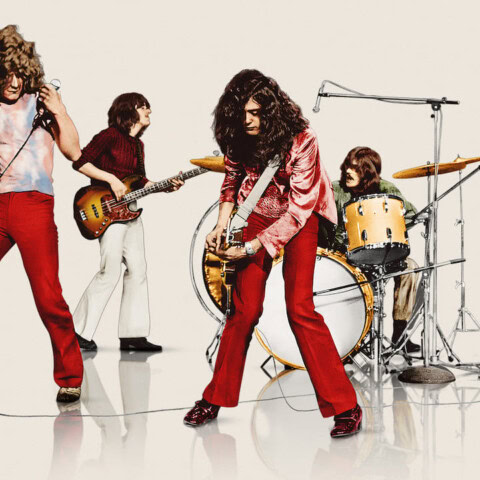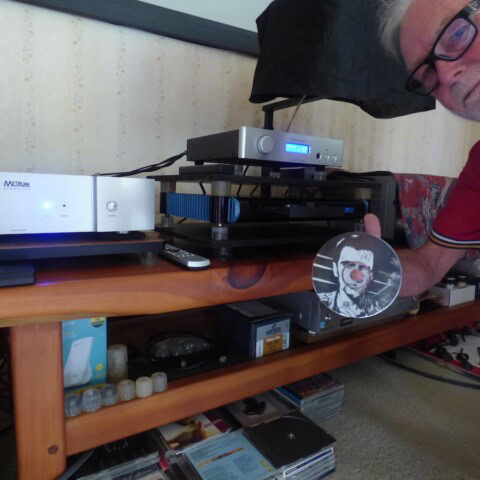Anthony and Stuart of Primitive Art Group explain the complex simplicity of their group’s explorative terrain to GARY STEEL.
 One Saturday night at the New Depot. A small audience perch on the wooden benches silently absorbing the musical insanity before them, and behind them. For below, onstage, bass, guiar and percussion keep a crazy, unsteady rhythm. When we’re least expecting it, two sax screams come blaring out of the darkness behind. Three-dimensional music. Truly, it puts one on edge and excites simultaneously.
One Saturday night at the New Depot. A small audience perch on the wooden benches silently absorbing the musical insanity before them, and behind them. For below, onstage, bass, guiar and percussion keep a crazy, unsteady rhythm. When we’re least expecting it, two sax screams come blaring out of the darkness behind. Three-dimensional music. Truly, it puts one on edge and excites simultaneously.
The ensemble is Wellington’s Primitive Art Group, who have played in various line-ups in and around this town for four years now. Sometimes I find myself enraptured, lost within the music. Other times it goes way over my head; I feel inferior, not up to the challenge.
This night, a rare group performance attracts a mere handful of people. I ask percussionist Anthony Donaldson and saxophonist Stuart Porter what effect this lack of response has on the group.
Support Witchdoctor’s ongoing mission to bring a wealth of new and historic music interviews, features and reviews to you this month (and all year round) as well as coverage of quality brand new, contemporary NZ and international music. Witchdoctor, entertainment for grownups. Your one-off (or monthly) $5 or $10 donation will support Witchdoctor.co.nz. and help us keep producing quality content. It’s really easy to donate, just click the ‘Become a supporter’ button below.
Anthony: “We get pissed off. Everywhere else you play, things go extremely well for you, but in your hometown… we put a lot of effort into those concerts, and got so little response in terms of people coming along. We made $30.”
Stuart: But nobody owes us anything. We made the decision a long time ago that we were never going to make anything out of the group. Everything goes straight back into the group fund. We’re doing it because we want to do it. But… I do feel we have something valid to offer.”
 I ask about the group’s longevity. Four years is a long time. How much longer will PAG stay this way?
I ask about the group’s longevity. Four years is a long time. How much longer will PAG stay this way?
Anthony: “Forever. It’s unanimously decided.”
Stuart: “It’s a lifetime thing.”
This, however, doesn’t preclude any activities outside the band. Stuart has plans for a big band of local improvising musicians, and Anthony enjoys duets. And then there’s the second Off The Deep End festival of improvisation to look forward to.
So where are PAG coming from? Is it jazz?
Stuart: “Jazz has been the centre of improvised music. The reason I started listening to jazz records was that element of improvisation. That’s why I took up music.”
Anthony: “Jazz has the swing thing, and I like it because it’s rhythmic, but it’s a very light rhythm, or it can be a very solid rhythm. It’s actually very elusive. You can do a lot with it. Rock music, it’s so solid it’s really hard to break away from. A very restrictive rhythm.”
Stuart: “In jazz, the form is there but it’s not important. It’s what you do with the form that matters. It’s a music you have to be initiated in. You have to hear a lot of it to be able to understand what we’re doing with it. But… there’s nothing inherently more complicated about what we do. In fact it’s even simpler. If you take the analogy of the primitive art group… we’re primitive in that we’re just blowing. We’re like children.”
Anthony: “The philosophy… it’s just question and answer.”
Stuart: “Dynamics, energy level, tension, masses, soft, loud… the level we operate on is very simple.”
Anthony: “It all centres around just listening to each other. And that’s pretty basic. It’s just listening. Someone does something and we respond to it.”
Stuart: “I listen in terms of ‘up’, ‘down’, whether he’s being aggressive, or laying back.”
Anthony: “All of us have a good understanding of the other people’s instruments, and how they approach it. I have a fair idea of the saxophone. I don’t know how to play one, but I know the problems, the limitations. They understand what I like to do on drums, and the things that do and don’t work.”
Stuart: “In the process of learning an instrument, you come across sounds which supposedly aren’t musical. You start considering those sounds as valid sounds, as well as the sounds that instruments are supposed to make. Then you get close to understanding what we’re doing, because all we’re doing is considering every sound, not just sounds that we’re supposed to consider. “
Anthony: Quite often the traditional technique of learning the instrument can inhibit what’s happening.”
Stuart: “Teach yourself clarinet books teach ‘never bite the reed”. But, if you bite the reed you get an amazing sound. [Stuart demonstrates the technique with a manificent shriek]. So you learn to bite the reed, and you develop your own technique for biting the reed. Different ways, different positions you can put your teeth on the reed to get different squeaks. And you learn to control those squeaks, and if you’re really fanatical you might even learn to play a scale of squeaks.”
Anthony: “A lot of people think squeaks are squeaks. They don’t realise you can play pure melody using squeaks and scrapes and all that sort of shit. You can do anything you want and use it as pure music.”
Stuart: “They hear a squeak and they hear a squeak in their mind, instead of using it as pure sound.”
 Once Anthony and Stuart get going, I know I’m in for the most intensive musical education session I’ve had in some time. They make it plain that their music is very structured and organised, despite the ‘free’ tag. The ideal, says Stuart, is spontaneous composition within a song, which could only occur with the highest degree of discipline. A PAG piece is improvised in part. And that’s improvised as opposed to jammed. PAG do not jam. And when they improvise they know to a tee how to respond to each other. They have even devised their own music charts for each piece.
Once Anthony and Stuart get going, I know I’m in for the most intensive musical education session I’ve had in some time. They make it plain that their music is very structured and organised, despite the ‘free’ tag. The ideal, says Stuart, is spontaneous composition within a song, which could only occur with the highest degree of discipline. A PAG piece is improvised in part. And that’s improvised as opposed to jammed. PAG do not jam. And when they improvise they know to a tee how to respond to each other. They have even devised their own music charts for each piece.
Says Anthony: “We’re very concerned with every note we play. With the sort of music we do, in one piece we can have about eight different feels, and that can only happen if we’ve all agreed there are no time signatures, or chord patterns. Quite often, Stuart might be playing bebop, and we might be doing a Latin thing underneath him. And Dave Watson (guitar) may be playing something free. And then all of us will just decide to play free, and all this happening within a minute. That, to me, is the exciting part. You start locking in with each other, and you know it, because you can hear it. Stuart might do a bebop pattern, and we hear it, and choose whether we want to follow him or not. And quite often we follow him in that mind-wise we know he’s playing bebop, but we decide to do something else and play a trick underneath him, and then humour comes in. The challenge is just ultimate.”
The Primitive Art Group have never released a record. Persuade them.
+ This piece was originally published in TOM magazine in 1983. Primitive Art Group did go on to release an album Future Jaw-Clap (1985), create their own Braille record label, and split into many different projects. Their foundational work helped to create a thriving jazz-oriented network/scene in Wellington. It was hard to find both photos and audio to go with this story. If anyone has any pics of the group or knows of any sound files available to link to this story, please let me know!














